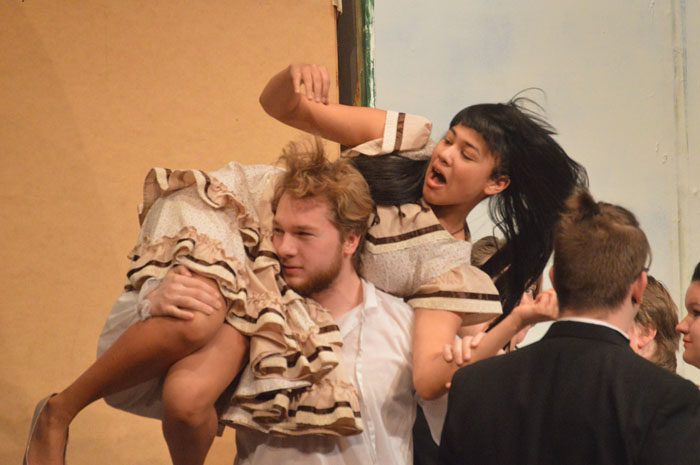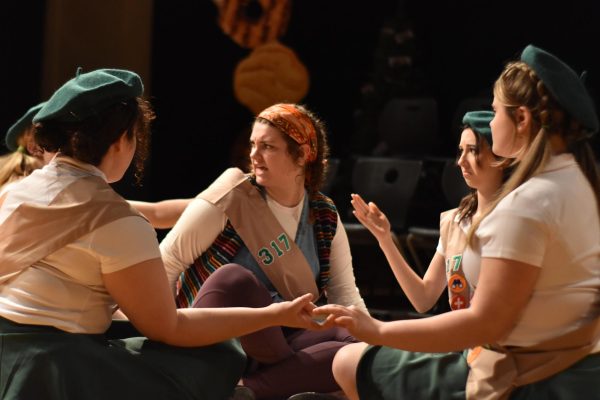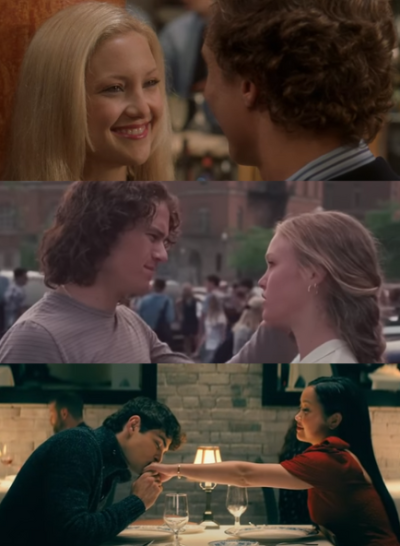From Cards to hillbillies
March 3, 2017
During the 1960s, American pop culture consisted of events such as the Civil Rights Movement and the Vietnam War. While these events have influenced culture today, no SHS students were alive during this time period.
With this year’s spring play, “The Beverly Hillbillies,” being set in 1960s California, factors like setting and characterization have made it particularly tough for actors to transition into their roles. With no firsthand experience of their characters’ lifestyles, this change has proved to be a challenging one.
Senior Kendall March is one actress who says she has had a difficult time transforming into her role. She plays the part of Granny, who is an old woman from the South.
The main problem March dealt with when becoming her character was the age difference. Because of this, she says her role and her real self do not have similar personalities or characteristics.
“I’m definitely not an old woman,” March said. “I had to watch the (TV) show a lot to understand the person she was.”
In order to compensate for these differences, March says she has tried to act more like her character in real life. She notes that drawing parallels between herself and her role has helped the process of becoming Granny.
“The more I act like her (Granny), the easier it is for me to do on stage,” March said.
Another actor who has dealt with this transition is junior Jonathan Pierce. He plays the character of Colonel Foxhall, who is also of Southern descent.
For his role, Pierce has to speak with a specific accent and dialect, which differ heavily from his own. He says this is difficult for him, as he cannot always completely understand what his character is trying to say by his word choice.
“The dialect I have to do takes a lot of time,” Pierce said. “It’s a little more difficult, but it’s coming together.”
While dealing with this problem, Pierce notes that it’s been hard for him to keep his overall performance consistent. He feels that since he doesn’t always understand his character, it becomes increasingly difficult to act out the part.
“It’s hard to believe I know what I’m talking about,” Pierce said. “Even though I don’t know what I’m talking about,” Pierce said.
In order to better understand their parts, both Pierce and March have had theater teacher Barbara Whitlock assisting them. She says that characterization for this show is unlike many others, and that the actors play roles totally different from their real selves.
Whitlock believes that age, along with the time period, are some of the major elements of the show that have made this show difficult for actors. Since none of the characters are young people, let alone from the present day, it is tough for actors to relate to their roles.
“There isn’t one person who resembles anything that we (the actors/audience) know,” Whitlock said. “Even the party guests are not teenagers.”
To deal with these differences, Whitlock says the task becomes learning about the background, behavior and language of their characters. The actors and herself have been researching different aspects of the play, whether it be by looking up definitions for different words, or by studying the characters of the TV show version of the play.
“There are so many words we had to look up,” Whitlock said. “A lot of words that the kids …didn’t know.”
Through the performance of the play, Whitlock hopes that the actors will accurately portray the messages it presents about the time period, despite the differences shared by the actors and their roles.








